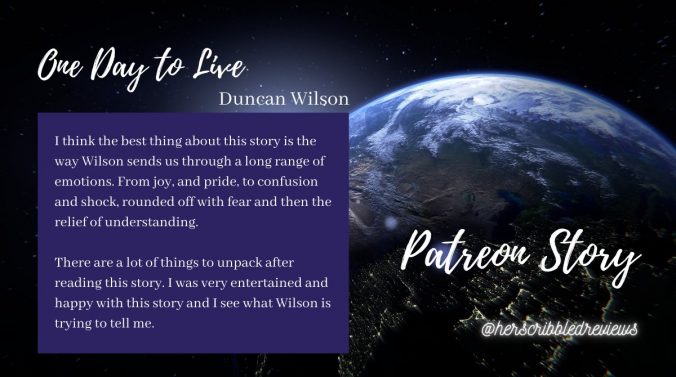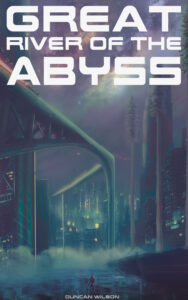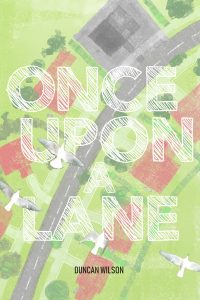“Hello.”
I opened my eyes for the first time. I saw for the first time. I saw him looking at me. He was standing there, motionless. We were surrounded by mists.
I opened my… mouth, and spoke for the first time, “Hello.”
He stared at me, with no expression and no expectation. I turned my… head and looked around. There were only him and… me. I looked down at myself. I looked much like him.
He spoke again, “Do you know what you are?”
I thought, and knew that I did, “I am a god.”
He nodded, his face still and passive. He did not seem surprised. I was not surprised. I wondered why. Looking at that calm face, I asked, “Are you also a god?”
“Yes. We are all gods here.”
“Here?” As I said it, I began to see where we were. It was all mist, but the mists had shape, and purpose, and they took the form of what was needed, when it was needed. We were standing in the mists, but there were others there as well, hidden for the moment, in shapes yet unknown to me, their place and purpose shrouded beyond my sight.
He spoke to me again, “Do you know who you are?”
I opened my mouth, but could not answer. I did not know this. Not yet.
He nodded at my silence and said, “This is natural. No god knows themself, not at first. All will become clear when it needs to be clear.”
He turned to leave, and was walking away into the mists before I thought to speak again, calling out to him as he became less defined in my sight, “Wait!” I cried, “Can I walk with you?”
He stopped and turned toward me, his face now solemn, “No one can walk with me. That is my nature. I walk alone.” He did not turn away with these words and I wondered why. He spoke again, “No one can walk with me, but… you can walk where I walk.”
So I followed him. I knew nothing yet, except him, and I wanted to know more. I wanted to know everything. Perhaps that was who I was, the one who wanted to know things. I did not know for sure. It would do for now. As he walked alone and I walked in his footsteps, the mists that were before him parted and lifted, and there were now chambers and hallways formed from them, running in every direction that was, and in every direction that was not. There were others, but they did not look like him. They all looked like themselves, and like each other. There were small gods and large gods, there were gods with many heads and faces and gods with none. There were dark gods who were shrouded in shadow and bright gods who blazed and shone, and both were difficult to look at. Some of the gods looked busy and were hurrying about from one path to another, in and out of chambers. Other gods seemed to have no purpose, and were standing there, silent, still, and serene.
Looking around at all of these gods, I asked him, “Who are they?”
“They are gods, like you.”
“Like me. Like you?”
“There are no gods like me.”
“But you are like you.”
“Yes, I am like me.”
“But… who are they?”
“Who are you?”
I did not know this yet, and asked no more then, thinking on his question.
He walked on, on and on, down many hallways, always moving, never hesitating. He seemed to have a purpose. I did not know if I had a purpose. I wanted a purpose. Perhaps he knew. I followed him. We entered a great chamber, larger than all the others before it, larger than anything. There were countless gods in the chamber, and I looked at every one of them in turn. They were all unique, yet they were all the same. None looked like me, yet all of them did.
This made me wonder, and I asked him as I followed him deep into the chamber, “Why are there so many of us?”
“Each god was created to serve a purpose.”
“What is that purpose?”
“To be created.”
“We exist to exist?”
“Gods exist when they need to exist.”
“How long have you existed?”
He stopped and thought before answering, “I have always existed.”
“You have always needed to exist?”
“Yes.”
“Did you create us?”
He shook his head, but did not laugh, “No, we do not create gods. We are gods.”
“What do we create?”
“We create nothing. We are created.”
“Then what do we do?”
“We do nothing. We are gods.”
“But if we do nothing, we must have no purpose.”
He shook his head and started walking again, saying as he strode onward, “Each of us has a purpose. Each of us has our own purpose, and they are all the same purpose. This is natural.”
I did not understand. Not yet. So I followed once more. We passed by many gods of strange and fearful description, we passed by many gods who did not appear as anything at all, but were still there. Some of these gods towered above all the others, and when they moved, the mists took new forms around them. When they stretched their limbs in any direction, the chamber and the hallways changed in turn. I saw one of these gods step on a lesser god, and when he stepped away, I could no longer see the smaller. I asked him about this, wondering where the missing god had gone, but he only shook his head and walked on.
He left the great chamber and walked on, on and on he walked, the steps he took were measureless and the mists billowed all around. He entered a chamber, a small chamber much like where I first opened my eyes, and I followed. There was no one in this chamber, only him and only me. He stopped and he waited, and I stopped and I waited. I knew there was no time, not for gods, but we waited.
At last he spoke, and his word was, “Hello,” and there was another in the chamber with him and with me.
This new god opened their eyes for the first time and spoke for the first time and their first word was an answer, “Hello.”
He asked the new god, “Do you know what you are?”
The new god spoke truth, “I am a god.”
He nodded, his face still and passive. The new god did not ask any questions.
He spoke to them again, “Do you know who you are?”
“I am that I am.”
He nodded and the new god left the chamber and walked away. He left the chamber and walked a different way. I followed him.
I wondered, and I asked, “They knew what they were.”
“Yes. This is natural.”
“I do not.”
“Yes. This is natural.” I did not understand. So I followed. He walked endlessly then entered another chamber. I entered the chamber. There was another god here. This was an old god. This was a very old god. They looked up at him and said, “I am not ready.”
He stood there, motionless, surrounded by mists.
“I do not want to die.”
“We do not die.”
“I can feel myself fading. I do not want to go.”
“You will not go. You will not die. We do not die.”
“What is happening to me?”
“You are. Soon, you will not be.”
“So I will die.”
“No. Once you were not. Now you are. Soon, you will no longer be. This is natural.”
They did not look pleased with this answer. They trembled and they shook. Then they were no more. I was alone in the chamber with him.
I looked at him, him who had been there when first I saw. He was a little smaller than before. I asked him, “Who were they?”
“They were a god.”
“If they were a god, why did they cease to be?”
“Because they were a god. They served their purpose, then they had no purpose, then they were no more. This is natural.”
“What was their purpose?”
“To be a god.”
Before he could turn to leave, I wondered, and I asked him, “What is your purpose?”
“My purpose is my own.” He would say no more. He left the chamber and I left the chamber and the chamber was no more. The mists had a purpose, and they took the form of that purpose. When that purpose ceased to be, the mists took a new purpose.
He walked forever, and I followed and I did not understand. Everywhere he went, new gods appeared, just as I had. Some were small, some were large. All the new gods knew what they were at first, but all knew their purpose, and just as I did not. Everywhere he went, old gods ceased to be, and everywhere he went, the old gods that were no more were forgotten. Only he seemed to remember the old gods that no longer were. Some appeared as new gods, only to become old gods and cease to be before they knew who they were. Every time an old god ceased to be, he was a little bit smaller.
I wondered, and I asked, “Why are there new gods when there are so many old gods? Why do old gods cease to be?”
“New gods serve new purposes. New gods serve old purposes. They are all unique purposes and they are all the same. All gods are created to answer a question. When that question is answered, they no longer need to be. This is natural.”
“You have always been here, but other gods come and other gods go. Will you ever cease to be?”
He shook his head and answered, “No, I will always have a purpose.”
“What is that purpose?”
“I am the god of the unasked questions, I am the god of the unanswered and the unknown, I am the god of the gaps, and I will always be.”
He was standing there, motionless. I saw him looking at me. We were surrounded by mists. I understood. I knew my purpose. I looked at the god of the unquestioned questions with understanding and then I was not.
https://www.patreon.com/posts/god-of-gaps-40970309



